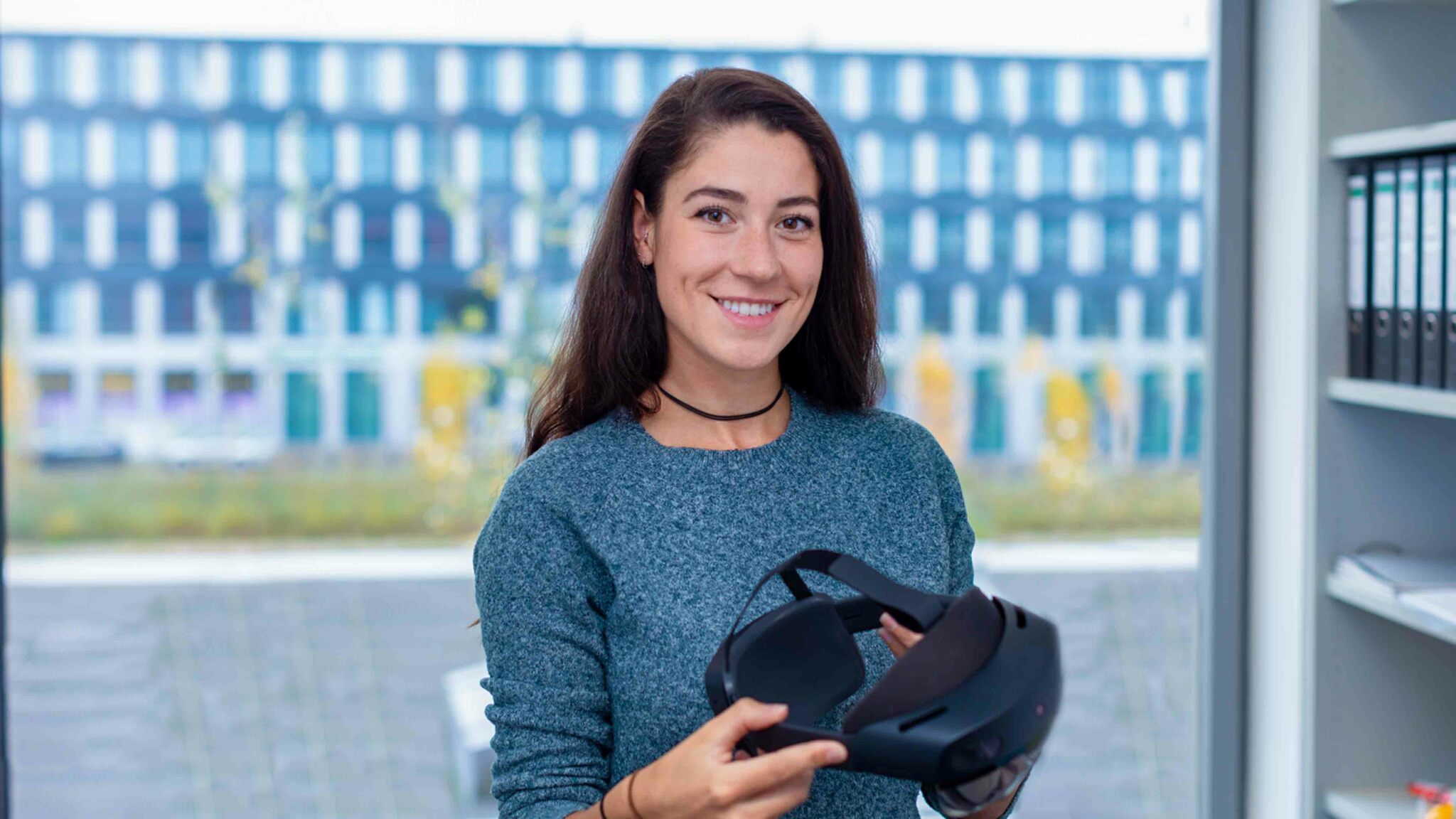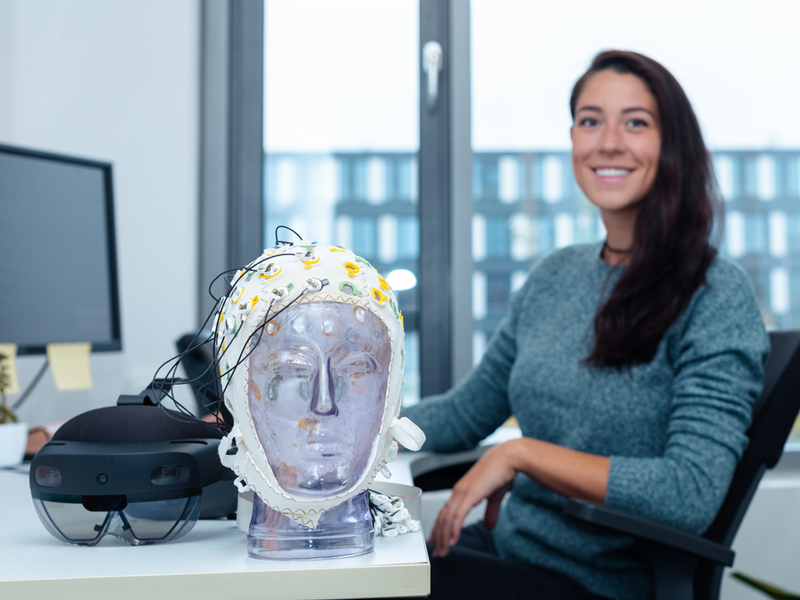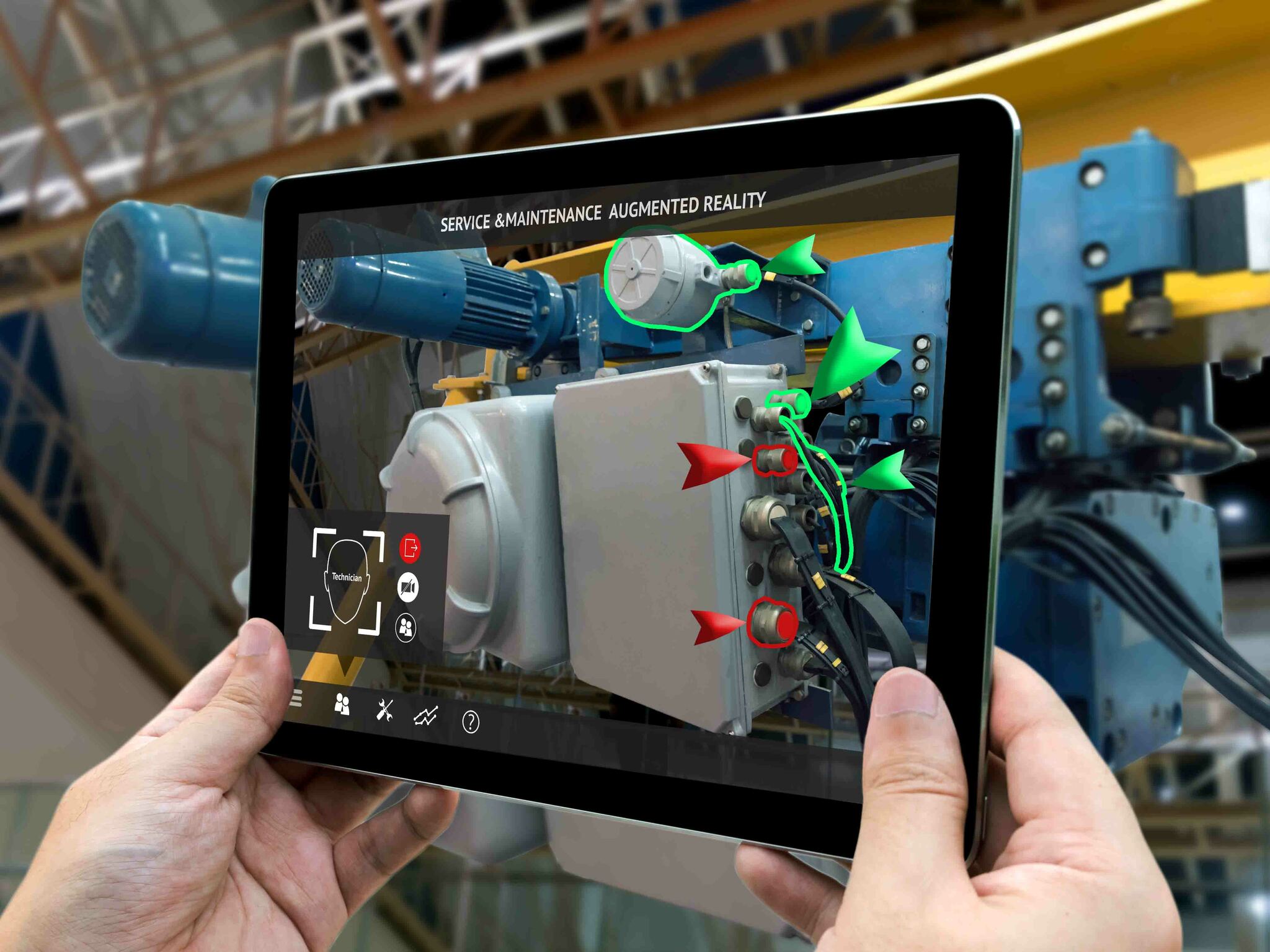
© Matej Meza / Universität Bremen
Research-Oriented Degree Lead the Way
The Central Academic Structure in Focus: Lisa-Marie Vortmann from the Cognitive Systems Lab
For Lisa-Marie Vortmann, getting a taste of a university at an early age has paid off. At the age of 17, she took part in cognitive science lectures at Osnabrück University. This shaped the direction she took in life: today, the 26-year-old works as a doctoral student in the Cognitive Systems Lab (CSL) of computer science professor Tanja Schultz.
No high-school diploma yet, but already at university? This is something Lisa-Marie Vortmann has experienced. While at school in the small town of Bramsche, high-school students had the opportunity to get a taste of regular events at Osnabrück University. “The student advisory service recommended that I take a look at the cognitive science degree course,” she recalls today. “Even back then, I had a great affinity for technology, mathematics, and logical thinking. Psychology or neurosciences would have been a good fit too. I thought about whether I would do that for a long time.”
But then it turned out to be cognitive science. Lisa-Marie Vortmann’s studies in Osnabrück were very interdisciplinary with a focus on the interplay of the brain and technology. The curriculum included computer science, psychology, neurobiology, neuroinformatics, and much more. “What particularly appealed to me was the high proportion of IT. I learned programming, for example, and even back then I knew that it would definitely be one of the basic skills you need to have.”
Work on Your Own Research Questions Early on
It was fun – and a bachelor’s and master’s degree were the result. “My studies were very research-intensive. Research questions already had to be dealt with in study projects or theses. I thought that was good.” But the young student didn’t just want to learn, she also wanted to pass on knowledge, which is why she was active as a tutor in several courses. “In the third semester, I was already standing in front of students myself. I found – and still do find – it very interesting, but also challenging, to pass on knowledge in the most comprehensible way possible.”

© Matej Meza / Universität Bremen
Listening to Lisa-Marie Vortmann describing her studies and university career, one word is always used: fun. You can feel that her enjoyment of the subject matter and the work makes her release energy to get to grips with the subject matter and to pass on the acquired knowledge to others. So it’s no wonder that she had her master’s degree in the bag in 2018 when she was just 23 years old – one semester less than the regular degree duration. The title of her master’s thesis: “Recognition of Shared Attention Based on EEG Data.” I’m sorry, what? “Specifically, it was about the shared visual attention, for example, when I have to observe two different things at the same time – for example, in road traffic.”
It all sounds very much like what she is currently doing in the Cognitive Systems Lab (CSL) at the University of Bremen. A former fellow student who was already working at the CSL drew her attention to a doctoral position in the Hanseatic city. “It was just right in terms of the topic. It’s also about attention research, where I can work with EEG data – obtained from brain computer interfaces.” It was particularly interesting for her that she could now delve even deeper into the area of computer science. “Attention-Aware Interaction Systems for Augmented Reality” is the title of their current third-party-funded project. Sounds like a challenge for laypersons – it’s very interesting for them.
Working with Augmented Reality
What it’s all about: augmented reality allows virtual objects to be displayed in the real world. “For example, you can look at a piece of furniture you want to buy in what will later be the real environment,” explains Lisa-Marie Vortmann. However, this also presents an increased “sensory input.” “In any case, our attention has always been preoccupied with separating the important from the unimportant.” If even more signals were added, what is the probability of being more distracted? “There are science-fiction scenarios in which we all run around with info glasses like Google Glass, in which a lot of information pops up. Can we even process it all?”

© zapp2photo / Adobe Stock
But there are “more realistic scenarios,” says the junior researcher, in which augmented reality can become an important aid – for example, in medicine or industry. “Our task now is to ensure that users are not distracted, but receive the optimum support to the right degree.” To achieve this, the system needs information about the user’s task on the one hand, but also information about the current level of attention on the other. Where are we looking? Are they thinking about something? Are they being distracted? “My research involves classifying the attention status of users using either eye-tracking data or brainwave data, and then using this information to adapt the system.”
Improve Device–User Interaction
The subjects she works with often wear an EEG cap or are equipped with an eye tracker. But not necessarily: the doctoral student is also working with smartphone-based augmented reality. “With all these things, we want to improve the interaction between the device and the user by giving the device a sort of ‘attention consciousness’ for the user.” Exciting and sometimes very complex research with a clear objective: “The technology itself is very promising, but at the moment it’s not adapted enough to the users. Managing that is what we’re working on.”
She’s implementing her project more or less on her own – under the guidance of her “supervisor” Felix Putze. Her full position as a doctoral student, which she received for a period of three years, has just been extended for another six months. Her doctorate is cumulative, i.e., based on a large number of specialist articles that she writes during her time at the CSL. “I then submitted them to journals or international conferences. It was, of course, a pity that the coronavirus got in the way. This not only forced me to work from home for a year and a half, but also prevented me from attending international conferences – most of which took place virtually. I still went to China, but Hawaii was unfortunately canceled as a face-to-face event.”
Lots of Fun and Enthusiasm Teaching
In addition to her academic work, Lisa-Marie Vortmann has also undergone further training. “Last week, for example, I attended a seminar on how to raise third-party funding for postdocs. Of course, that’s great for your future career,” she says. This also applies to the university teaching certificate offered jointly by the universities of Bremen, Oldenburg, and Osnabrück. It’s a type of training for academic teaching. “Last semester, I was able to organize a course for master’s students for the first time. The topic was “Advanced Machine Learning.” Due to the coronavirus pandemic, the seminar had to be held virtually. The content was provided with videos, an online Q&A session was held once a week, and online tutorials were offered. “I practically had the patronage and got it all up and running: content, procedure, organization.”
“After completing my doctorate, I see myself carrying on at university – which one is yet to be decided.”
Good Advice from Colleagues
Lisa-Marie Vortmann plans to complete her dissertation in spring 2022. She is certain that she wants to continue working as a scientist: “Combining teaching and research is the right path for me.” Experienced colleagues at her institute provide her with good advice on which direction she could take and what to expect. “After completing my doctorate, I see myself carrying on at university – which one is yet to be decided.”
It is helpful for her that she is a woman working in a highly sought-after specialist field. Female scientists are very welcome in engineering and information technology professions. “And even if I find a gap between positions, that’s not a problem for me. I know how to fill that time!” The young junior researcher has also achieved remarkable results outside of university – for example, as a player on a competitive tennis team. She also trains beginner’s groups of children, young people, and adults. She has been doing it for ten years now, and successfully at that: “You can also earn good money with it. For me, however, this will remain a part-time job!”
Further information
Website Cognitive Science Lab